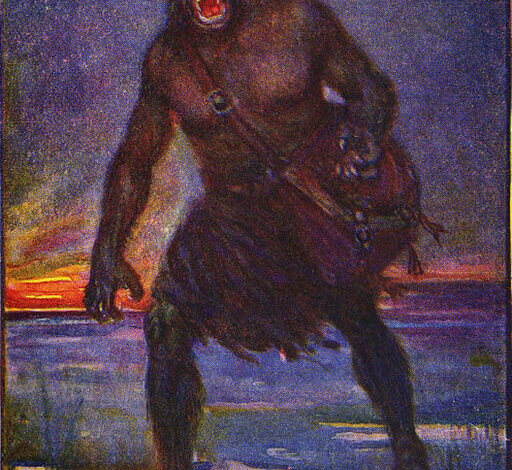
The Wendigo by Algernon Blackwood
Chapter 3
Thus, it seemed to him, at least. Yet it was true that the lap of the water, just beyond the tent door, still beat time with his lessening pulses when he realized that he was lying with his eyes open and that another sound had recently introduced itself with cunning softness between the splash and murmur of the little waves.
And, long before he understood what this sound was, it had stirred in him the centers of pity and alarm. He listened intently, though at first in vain, for the running blood beat all its drums too noisily in his ears. Did it come, he wondered, from the lake, or from the woods?…
Then, suddenly, with a rush and a flutter of the heart, he knew that it was close beside him in the tent; and, when he turned over for a better hearing, it focused itself unmistakably not two feet away. It was a sound of weeping; Défago upon his bed of branches was sobbing in the darkness as though his heart would break, the blankets evidently stuffed against his mouth to stifle it.
And his first feeling, before he could think or reflect, was the rush of a poignant and searching tenderness. This intimate, human sound, heard amid the desolation about them, woke pity. It was so incongruous, so pitifully incongruous—and so vain! Tears—in this vast and cruel wilderness: of what avail? He thought of a little child crying in mid-Atlantic…. Then, of course, with fuller realization, and the memory of what had gone before, came the descent of the terror upon him, and his blood ran cold.
“Défago,” he whispered quickly, “what’s the matter?” He tried to make his voice very gentle. “Are you in pain—unhappy—?” There was no reply, but the sounds ceased abruptly. He stretched his hand out and touched him. The body did not stir.
“Are you awake?” for it occurred to him that the man was crying in his sleep. “Are you cold?” He noticed that his feet, which were uncovered, projected beyond the mouth of the tent. He spread an extra fold of his own blankets over them. The guide had slipped down in his bed, and the branches seemed to have been dragged with him. He was afraid to pull the body back again, for fear of waking him.
One or two tentative questions he ventured softly, but though he waited for several minutes there came no reply, nor any sign of movement. Presently he heard his regular and quiet breathing, and putting his hand again gently on the breast, felt the steady rise and fall beneath.
“Let me know if anything’s wrong,” he whispered, “or if I can do anything. Wake me at once if you feel—queer.”
He hardly knew what to say. He lay down again, thinking and wondering what it all meant. Défago, of course, had been crying in his sleep. Some dream or other had afflicted him. Yet never in his life would he forget that pitiful sound of sobbing, and the feeling that the whole awful wilderness of woods listened….
His own mind busied itself for a long time with the recent events, of which this took its mysterious place as one, and though his reason successfully argued away all unwelcome suggestions, a sensation of uneasiness remained, resisting ejection, very deep-seated—peculiar beyond ordinary.
Chapter 4
But sleep, in the long run, proves greater than all emotions. His thoughts soon wandered again; he lay there, warm as toast, exceedingly weary; the night soothed and comforted, blunting the edges of memory and alarm. Half an hour later he was oblivious of everything in the outer world about him.
Yet sleep, in this case, was his great enemy, concealing all approaches, smothering the warning of his nerves.
As, sometimes, in a nightmare events crowd upon each other’s heels with a conviction of dreadfulest reality, yet some inconsistent detail accuses the whole display of incompleteness and disguise, so the events that now followed, though they actually happened, persuaded the mind somehow that the detail which could explain them had been overlooked in the confusion, and that therefore they were but partly true, the rest delusion. At the back of the sleeper’s mind something remains awake, ready to let slip the judgment. “All this is not quite real; when you wake up you’ll understand.”
And thus, in a way, it was with Simpson. The events, not wholly inexplicable or incredible in themselves, yet remain for the man who saw and heard them a sequence of separate facts of cold horror, because the little piece that might have made the puzzle clear lay concealed or overlooked.
So far as he can recall, it was a violent movement, running downwards through the tent towards the door, that first woke him and made him aware that his companion was sitting bolt upright beside him—quivering. Hours must have passed, for it was the pale gleam of the dawn that revealed his outline against the canvas. This time the man was not crying; he was quaking like a leaf; the trembling he felt plainly through the blankets down the entire length of his own body. Défago had huddled down against him for protection, shrinking away from something that apparently concealed itself near the door flaps of the little tent.
Simpson thereupon called out in a loud voice some question or other—in the first bewilderment of waking he does not remember exactly what—and the man made no reply. The atmosphere and feeling of true nightmare lay horribly about him, making movement and speech both difficult. At first, indeed, he was not sure where he was—whether in one of the earlier camps, or at home in his bed at Aberdeen. The sense of confusion was very troubling.
And next—almost simultaneous with his waking, it seemed—the profound stillness of the dawn outside was shattered by a most uncommon sound. It came without warning, or audible approach; and it was unspeakably dreadful. It was a voice, Simpson declares, possibly a human voice; hoarse yet plaintive—a soft, roaring voice close outside the tent, overhead rather than upon the ground, of immense volume, while in some strange way most penetratingly and seductively sweet. It rang out, too, in three separate and distinct notes, or cries, that bore in some odd fashion a resemblance, farfetched yet recognizable, to the name of the guide: “Dé-fa-go!”
The student admits he is unable to describe it quite intelligently, for it was unlike any sound he had ever heard in his life, and combined a blending of such contrary qualities. “A sort of windy, crying voice,” he calls it, “as of something lonely and untamed, wild and of abominable power….”
And, even before it ceased, dropping back into the great gulfs of silence, the guide beside him had sprung to his feet with an answering though unintelligible cry. He blundered against the tent pole with violence, shaking the whole structure, spreading his arms out frantically for more room, and kicking his legs impetuously free of the clinging blankets. For a second, perhaps two, he stood upright by the door, his outline dark against the pallor of the dawn; then, with a furious, rushing speed, before his companion could move a hand to stop him, he shot with a plunge through the flaps of canvas—and was gone. And as he went—so astonishingly fast that the voice could actually be heard dying in the distance—he called aloud in tones of anguished terror that at the same time held something strangely like the frenzied exultation of delight—
“Oh! oh! My feet of fire! My burning feet of fire! Oh! oh! This height and fiery speed!”
And then the distance quickly buried it, and the deep silence of very early morning descended upon the forest as before.
It had all come about with such rapidity that, but for the evidence of the empty bed beside him, Simpson could almost have believed it to have been the memory of a nightmare carried over from sleep. He still felt the warm pressure of that vanished body against his side; there lay the twisted blankets in a heap; the very tent yet trembled with the vehemence of the impetuous departure. The strange words rang in his ears, as though he still heard them in the distance—wild language of a suddenly stricken mind. Moreover, it was not only the senses of sight and hearing that reported uncommon things to his brain, for even while the man cried and ran, he had become aware that a strange perfume, faint yet pungent, pervaded the interior of the tent. And it was at this point, it seems, brought to himself by the consciousness that his nostrils were taking this distressing odor down into his throat, that he found his courage, sprang quickly to his feet—and went out.
The grey light of dawn that dropped, cold and glimmering, between the trees revealed the scene tolerably well. There stood the tent behind him, soaked with dew; the dark ashes of the fire, still warm; the lake, white beneath a coating of mist, the islands rising darkly out of it like objects packed in wool; and patches of snow beyond among the clearer spaces of the Bush—everything cold, still, waiting for the sun. But nowhere a sign of the vanished guide—still, doubtless, flying at frantic speed through the frozen woods. There was not even the sound of disappearing footsteps, nor the echoes of the dying voice. He had gone—utterly.
There was nothing; nothing but the sense of his recent presence, so strongly left behind about the camp; and—this penetrating, all-pervading odor.
And even this was now rapidly disappearing in its turn. In spite of his exceeding mental perturbation, Simpson struggled hard to detect its nature, and define it, but the ascertaining of an elusive scent, not recognized subconsciously and at once, is a very subtle operation of the mind. And he failed. It was gone before he could properly seize or name it. Approximate description, even, seems to have been difficult, for it was unlike any smell he knew. Acrid rather, not unlike the odor of a lion, he thinks, yet softer and not wholly unpleasing, with something almost sweet in it that reminded him of the scent of decaying garden leaves, earth, and the myriad, nameless perfumes that make up the odor of a big forest. Yet the “odor of lions” is the phrase with which he usually sums it all up.
Then—it was wholly gone, and he found himself standing by the ashes of the fire in a state of amazement and stupid terror that left him the helpless prey of anything that chose to happen. Had a muskrat poked its pointed muzzle over a rock, or a squirrel scuttled in that instant down the bark of a tree, he would most likely have collapsed without more ado and fainted. For he felt about the whole affair the touch somewhere of a great Outer Horror … and his scattered powers had not as yet had time to collect themselves into a definite attitude of fighting self-control.
Nothing did happen, however. A great kiss of wind ran softly through the awakening forest, and a few maple leaves here and there rustled tremblingly to earth. The sky seemed to grow suddenly much lighter. Simpson felt the cool air upon his cheek and uncovered head; realized that he was shivering with the cold; and, making a great effort, realized next that he was alone in the Bush—and that he was called upon to take immediate steps to find and succor his vanished companion.
Make an effort, accordingly, he did, though an ill-calculated and futile one. With that wilderness of trees about him, the sheet of water cutting him off behind, and the horror of that wild cry in his blood, he did what any other inexperienced man would have done in similar bewilderment: he ran about, without any sense of direction, like a frantic child, and called loudly without ceasing the name of the guide:
“Défago! Défago! Défago!” he yelled, and the trees gave him back the name as often as he shouted, only a little softened—”Défago! Défago! Défago!”
He followed the trail that lay a short distance across the patches of snow, and then lost it again where the trees grew too thickly for snow to lie. He shouted till he was hoarse, and till the sound of his own voice in all that unanswering and listening world began to frighten him. His confusion increased in direct ratio to the violence of his efforts. His distress became formidably acute, till at length his exertions defeated their own object, and from sheer exhaustion he headed back to the camp again. It remains a wonder that he ever found his way. It was with great difficulty, and only after numberless false clues, that he at last saw the white tent between the trees, and so reached safety.
Exhaustion then applied its own remedy, and he grew calmer. He made the fire and breakfasted. Hot coffee and bacon put a little sense and judgment into him again, and he realized that he had been behaving like a boy. He now made another, and more successful attempt to face the situation collectedly, and, a nature naturally plucky coming to his assistance, he decided that he must first make as thorough a search as possible, failing success in which, he must find his way into the home camp as best he could and bring help.
And this was what he did. Taking food, matches and rifle with him, and a small axe to blaze the trees against his return journey, he set forth. It was eight o’clock when he started, the sun shining over the tops of the trees in a sky without clouds. Pinned to a stake by the fire he left a note in case Défago returned while he was away.
This time, according to a careful plan, he took a new direction, intending to make a wide sweep that must sooner or later cut into indications of the guide’s trail; and, before he had gone a quarter of a mile he came across the tracks of a large animal in the snow, and beside it the light and smaller tracks of what were beyond question human feet—the feet of Défago. The relief he at once experienced was natural, though brief; for at first sight he saw in these tracks a simple explanation of the whole matter: these big marks had surely been left by a bull moose that, wind against it, had blundered upon the camp, and uttered its singular cry of warning and alarm the moment its mistake was apparent. Défago, in whom the hunting instinct was developed to the point of uncanny perfection, had scented the brute coming down the wind hours before. His excitement and disappearance were due, of course, to—to his—
Then the impossible explanation at which he grasped faded, as common sense showed him mercilessly that none of this was true. No guide, much less a guide like Défago, could have acted in so irrational a way, going off even without his rifle …! The whole affair demanded a far more complicated elucidation, when he remembered the details of it all—the cry of terror, the amazing language, the grey face of horror when his nostrils first caught the new odor; that muffled sobbing in the darkness, and—for this, too, now came back to him dimly—the man’s original aversion for this particular bit of country….
Besides, now that he examined them closer, these were not the tracks of a bull moose at all! Hank had explained to him the outline of a bull’s hoofs, of a cow’s or calf s, too, for that matter; he had drawn them clearly on a strip of birch bark. And these were wholly different. They were big, round, ample, and with no pointed outline as of sharp hoofs. He wondered for a moment whether bear tracks were like that. There was no other animal he could think of, for caribou did not come so far south at this season, and, even if they did, would leave hoof marks.
They were ominous signs—these mysterious writings left in the snow by the unknown creature that had lured a human being away from safety—and when he coupled them in his imagination with that haunting sound that broke the stillness of the dawn, a momentary dizziness shook his mind, distressing him again beyond belief. He felt the threatening aspect of it all. And, stooping down to examine the marks more closely, he caught a faint whiff of that sweet yet pungent odor that made him instantly straighten up again, fighting a sensation almost of nausea.
Then his memory played him another evil trick. He suddenly recalled those uncovered feet projecting beyond the edge of the tent, and the body’s appearance of having been dragged towards the opening; the man’s shrinking from something by the door when he woke later. The details now beat against his trembling mind with concerted attack. They seemed to gather in those deep spaces of the silent forest about him, where the host of trees stood waiting, listening, watching to see what he would do. The woods were closing round him.
With the persistence of true pluck, however, Simpson went forward, following the tracks as best he could, smothering these ugly emotions that sought to weaken his will. He blazed innumerable trees as he went, ever fearful of being unable to find the way back, and calling aloud at intervals of a few seconds the name of the guide. The dull tapping of the axe upon the massive trunks, and the unnatural accents of his own voice became at length sounds that he even dreaded to make, dreaded to hear. For they drew attention without ceasing to his presence and exact whereabouts, and if it were really the case that something was hunting himself down in the same way that he was hunting down another—
With a strong effort, he crushed the thought out the instant it rose. It was the beginning, he realized, of a bewilderment utterly diabolical in kind that would speedily destroy him.
Although the snow was not continuous, lying merely in shallow flurries over the more open spaces, he found no difficulty in following the tracks for the first few miles. They went straight as a ruled line wherever the trees permitted. The stride soon began to increase in length, till it finally assumed proportions that seemed absolutely impossible for any ordinary animal to have made. Like huge flying leaps they became. One of these he measured, and though he knew that “stretch” of eighteen feet must be somehow wrong, he was at a complete loss to understand why he found no signs on the snow between the extreme points. But what perplexed him even more, making him feel his vision had gone utterly awry, was that Défago’s stride increased in the same manner, and finally covered the same incredible distances. It looked as if the great beast had lifted him with it and carried him across these astonishing intervals. Simpson, who was much longer in the limb, found that he could not compass even half the stretch by taking a running jump.
And the sight of these huge tracks, running side by side, silent evidence of a dreadful journey in which terror or madness had urged to impossible results, was profoundly moving. It shocked him in the secret depths of his soul. It was the most horrible thing his eyes had ever looked upon. He began to follow them mechanically, absentmindedly almost, ever peering over his shoulder to see if he, too, were being followed by something with a gigantic tread…. And soon it came about that he no longer quite realized what it was they signified—these impressions left upon the snow by something nameless and untamed, always accompanied by the footmarks of the little French Canadian, his guide, his comrade, the man who had shared his tent a few hours before, chatting, laughing, even singing by his side….




